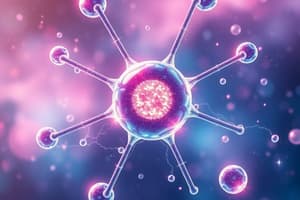Podcast
Questions and Answers
What is the atomic symbol for hydrogen?
What is the atomic symbol for hydrogen?
- H (correct)
- Hy
- Hg
- He
What is the net charge of a hydrogen atom during covalent bonding?
What is the net charge of a hydrogen atom during covalent bonding?
- 0 (correct)
- +1
- -1
- +2
What is the electron configuration of hydrogen?
What is the electron configuration of hydrogen?
- 1d
- 1p
- 2s
- 1s (correct)
What is the ionization energy of hydrogen?
What is the ionization energy of hydrogen?
What is the atomic charge of hydrogen?
What is the atomic charge of hydrogen?
What is the approximate atomic radius of hydrogen?
What is the approximate atomic radius of hydrogen?
What is the atomic symbol of hydrogen?
What is the atomic symbol of hydrogen?
How many protons are present in the nucleus of a hydrogen atom?
How many protons are present in the nucleus of a hydrogen atom?
What does the atomic charge of an isolated hydrogen atom indicate?
What does the atomic charge of an isolated hydrogen atom indicate?
Why was the initial atomic symbol 'hydrogenium' abandoned for hydrogen?
Why was the initial atomic symbol 'hydrogenium' abandoned for hydrogen?
In the context of atomic charge, what is the role of neutrons in an atom?
In the context of atomic charge, what is the role of neutrons in an atom?
What does the atomic number of an element represent?
What does the atomic number of an element represent?
Flashcards are hidden until you start studying
Study Notes
Unraveling Hydrogen: Atomic Symbol and Charge
Hydrogen, the first element on the periodic table, is a fundamental building block for life and the universe itself. Its name, derived from the Greek word "hydro-, hydro-" meaning water, hints at its role in water molecules and our planet's oceans. But to truly understand hydrogen's nature, it's essential to explore its atomic symbol and charge.
Atomic Symbol
Hydrogen's atomic symbol, H, is the first letter of its Latin name, "hydrogenium." However, this name was later abandoned in favor of the more modern, Greek-derived spelling, "hydrogen". The atomic symbol is a concise representation of the element's chemical symbol, which is H for hydrogen.
Atomic Charge
Every atom has a central nucleus, containing protons and (for most elements) neutrons. The protons carry a positive charge, while the neutrons are electrically neutral. The number of protons in an atom's nucleus is called its atomic number. For hydrogen, the atomic number is 1, meaning that hydrogen's nucleus contains 1 proton.
Since an atom is electrically neutral, its number of protons must equal its number of electrons. In the case of hydrogen, the atom has 1 electron. As a result, an isolated hydrogen atom has an atomic charge of 1, meaning that it has 1 positive charge from its proton and 1 negative charge from its single electron.
However, when hydrogen atoms form chemical bonds with other elements, they often share electrons, which can lead to the atoms having a net charge of 0. This is called covalent bonding and is a fundamental property of chemistry.
Electron Configuration
The arrangement of electrons in an atom is called its electron configuration. For hydrogen, the electron configuration is 1s. The number 1 indicates the energy level, and the letter s represents the type of subshell. In hydrogen's case, its single electron occupies the lowest energy level, 1s.
Ionization Energy
Ionization energy is the energy required to remove an electron from an atom in its ground state. For hydrogen, the ionization energy is relatively low at 13.6 eV (electron volts). This means that hydrogen atoms can be easily stripped of their electrons through chemical reactions or interactions with other particles.
Atomic Radius
Atomic radius is the distance between the atom's nucleus and its outermost electron. For hydrogen, the atomic radius is approximately 0.053 angstroms (Å). Hydrogen's small size makes it unique because it lacks many of the properties that larger atoms possess.
In summary, hydrogen is an element with a single proton in its nucleus and one electron orbiting that nucleus. Its atomic symbol is H, and its atomic charge is +1. Hydrogen's unique properties make it critical for understanding chemistry and the world around us.
Studying That Suits You
Use AI to generate personalized quizzes and flashcards to suit your learning preferences.




